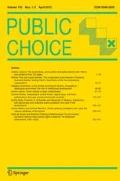Abstract
In an interesting recent paper, Dari-Mattiacci and Parisi (2005) extended Tullock's (1980) rent-seeking game with an entry decision. The mixed strategies identified by Dari-Mattiacci and Parisi for the case of increasing returns in the contest success function (r2) do not constitute an equilibrium of the game they study. However, these strategies are an equilibrium if the strategy space of the game is restricted by a minimum expenditure requirement, and this minimum expenditure requirement is an element of a specific interval.
Similar content being viewed by others
References
Aidt, T.S. (2002). Strategic political participation and redistribution. Economics and Politics, 14, 19–40.
Baye, M.R., Kovenock, D., & de Vries, C.G. (1994). The solution to the Tullock rent-seeking game when R2: mixed strategy equilibria and mean dissipation rates. Public Choice, 81, 363–380.
Corcoran, W.J. (1984). Long-run equilibrium and total expenditures in rent-seeking. Public Choice, 43, 89–94.
Corcoran, W.J., & Karels, G.V. (1985). Rent-seeking behavior in the long run. Public Choice, 46, 227–246.
Dari-Mattiacci, G., & Parisi, F. (2005). Rents, dissipation and lost treasures: rethinking Tullock's paradox. Public Choice, 124, 411–422.
Gradstein, M. (1995). Intensity of competition, entry and entry deterrence in rent seeking contests. Economics and Politics, 7, 79–91.
Higgins, R.S., Shughart, W.F., II, & Tollison, R.D. (1985). Free entry and efficient rent-seeking. Public Choice, 46, 247–258.
Hillman, A.L., & Samet, D. (1987). Dissipation of contestable rents by small numbers of contenders. Public Choice, 54, 63–82.
Lockard, A., & Tullock, G. (Eds.) (2000). Efficient rent-seeking: chronicle of an intellectual quagmire. Boston: Kluwer.
Schoonbeek, L., & Kooreman, P. (1997). Tullock's rent-seeking contest with a minimum expenditure requirement. Public Choice, 93, 477–486.
Tullock, G. (1980). Efficient rent-seeking. In: Buchanan, J.M., Tollison, G. & Tullock, G. (Eds.), Toward a theory of the rent-seeking society (pp. 97–112). College Station: Texas A&M University Press.
Yang, C.-L. (1993). Cooperation by credible threats: on the social costs of transfer contests under uncertainty. Journal of Institutional and Theoretical Economics, 149/3, 559–578.
Yang, C.-L. (1994). A simple extension of the Dasgupta-Maskin existence theorem for discontinuous games with an application to the theory of rent-seeking. Economics Letters, 45, 181–183.
Author information
Authors and Affiliations
Corresponding author
Rights and permissions
About this article
Cite this article
Münster, J. Rents, dissipation and lost treasures: Comment. Public Choice 130, 329–335 (2007). https://doi.org/10.1007/s11127-006-9088-y
Received:
Accepted:
Published:
Issue Date:
DOI: https://doi.org/10.1007/s11127-006-9088-y



